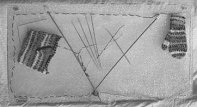
Staying Connected By Sandy Harrow Reprinted from Horsman & Woodrow (Eds.), 2006, p. 19

Staying Connected By Sandy Harrow Reprinted from Horsman & Woodrow (Eds.), 2006, p. 19
Whereas quantitative research is associated with numbers, qualitative research has been called "research words are at the heart of literacy practice, they are, like research, one way of knowing.
Some qualitative researchers and researchers in practice have been exploring how arts-based approaches can invite multiple and holistic ways for researchers and participants to explore, extend and express what they know (Buttignol, Jongeward, Smith, & Thomas, 2000). In particular, arts-based approaches can provide ways to tap into and express experiential and intuitive knowledge that we might not be able to express in words. Using arts-based approaches does not mean that we don't use words, however. Words are often needed to communicate meanings that are constructed through arts-based approaches (Eisner, 1997).
Arts-based approaches include video, collage, drawings, paintings, dramatic performances, scripted plays, musical compositions, photography, computer graphics, fabric arts, poetry, prose, movement, sculpture and other forms. The Guide includes examples of how researchers in practice have used arts-based approaches, along with other qualitative methods, at various stages of their research.
Arts-based approaches are not just for researchers and participants who see themselves as artists. As with other approaches, whether and how you use these approaches will depend on how they serve your purposes for research.
I completed a PhD at the University of Alberta in 1992. Soon after, I started work with The Learning Centre Literacy Association, a community-based literacy program in Edmonton where I had volunteered. Alongside my work as a co-coordinator and facilitator with the Association, I have had many opportunities to learn with others through research in practice.
My PhD research about metacognition and reading extended from a workplace reading program I had developed. My research drew on qualitative research approaches of the time, and this framework influenced me as I began to do research in practice and support other practitioners to do research.
My research thinking and practice has evolved and been influenced, in particular, by feminist qualitative approaches. My interest in arts-based research reflects my personal and professional interest in expressive arts approaches to teaching, learning and knowing. As well, I have been influenced by the support and perspectives of others who research and practice in the adult literacy field. In particular, colleagues have pushed my reflection and learning about working across identities and about ethics, topics we'll turn to in the later chapters.